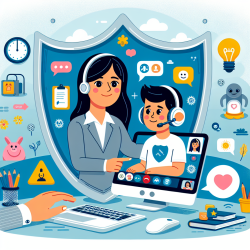As a Special Education Director, you are often faced with the challenge of ensuring the safety and well-being of your students, especially those who require specialized services like speech therapy. With the increasing shift towards online therapy services, it's natural to feel a bit lost navigating this new landscape. However, ensuring safety in online therapy doesn't have to be overwhelming.
At TinyEYE, we understand your concerns and are here to help you take the next step towards a safer and more effective online therapy experience for your students. Here are some essential considerations and strategies to ensure safety in online therapy:
1. Choosing a Reliable Provider
When selecting an online therapy provider, it's crucial to ensure they have a robust safety protocol in place. Look for providers who:
- Have a proven track record of working with schools and special education departments.
- Offer transparent policies regarding data privacy and security.
- Provide continuous training for their therapists on safety and ethical practices.
2. Ensuring Secure Technology
The technology used for online therapy sessions must be secure to protect student information. Key aspects to consider include:
- End-to-end encryption to ensure data privacy.
- Regular software updates to mitigate security vulnerabilities.
- User authentication to prevent unauthorized access.
3. Training and Support for Staff
It's essential that your staff is well-equipped to handle online therapy sessions safely. Consider implementing the following:
- Regular training sessions on the latest safety protocols and best practices.
- Support resources for staff to address any technical or safety concerns.
- Clear guidelines on how to handle and report any safety incidents.
4. Parental Involvement
Engaging parents in the online therapy process can significantly enhance safety and effectiveness. Encourage parents to:
- Participate in initial sessions to understand the process and technology.
- Provide a safe and quiet space at home for therapy sessions.
- Communicate regularly with therapists to monitor progress and address concerns.
5. Continuous Monitoring and Evaluation
Finally, ongoing monitoring and evaluation are crucial to maintaining safety in online therapy. Implement systems to:
- Regularly review therapy sessions and practices.
- Collect feedback from students, parents, and staff.
- Make necessary adjustments based on the feedback and latest safety standards.
At TinyEYE, we are committed to providing safe and effective online therapy services. Our team of experienced therapists and robust technology ensures that your students receive the highest quality care in a secure environment.
Feeling lost in the world of online therapy is understandable, but with the right strategies and support, you can confidently take the next step towards ensuring the safety and success of your students. Contact us today to learn more about how TinyEYE can help your school navigate the complexities of online therapy.










